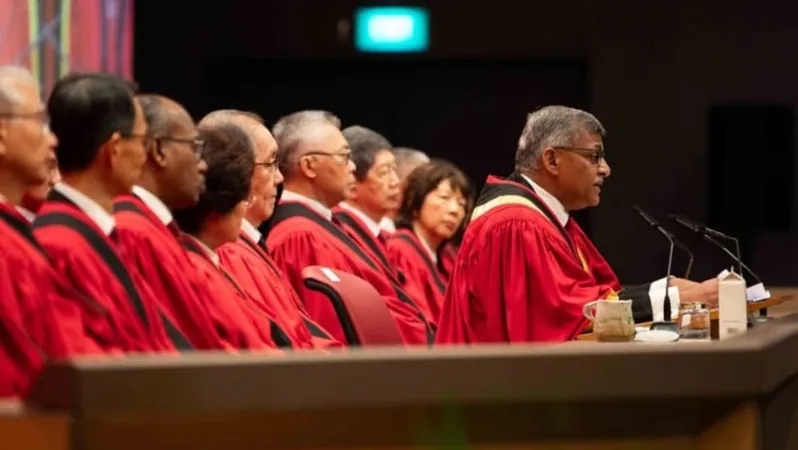
Singapore Takes Bold Step to Transform Handling of Sexual Offence Cases
2025-01-13
Author: Mei
Singapore's Groundbreaking Initiative on Sexual Offences
SINGAPORE — In a groundbreaking move, Chief Justice Sundaresh Menon announced on Monday, January 13, that Singapore's judiciary will implement new measures aimed at significantly improving the management of sexual offence cases. This initiative is a part of the opening of the 2025 legal year and comes as a response to the growing complexities and sensitivities involved in such cases.
Starting immediately, all sexual offence cases presented in the High Court and trials concerning certain sexual offences in the State Courts will now be overseen by a specially designated team of judges. These judges, who have undergone extensive training, are equipped with the necessary expertise to handle the intricacies of sexual crime trials that heavily impact both victims and defendants.
Chief Justice Menon highlighted the importance of delicate handling in these cases, noting, “These cases require careful handling because of the impact that the trial process can have on both complainants and accused persons.”
Specialist List and Training for Judges
In detail, the specialist list in the High Court will cover all aspects of sexual offence proceedings — from trials to guilty pleas, magistrate's appeals, criminal motions, and revisions. In the State Courts, this list specifically addresses serious sexual offences, including those involving penetrative acts, exploitation of vulnerable individuals, abuse of trust, as well as cases involving special needs individuals who may face challenges in giving evidence.
Currently, the specialist list includes seven judges in the High Court and 12 district judges allocated for the State Courts. This initiative goes beyond mere assignment; it is coupled with enhanced training and resource development to foster a deeper understanding of the intricacies in handling such sensitive cases.
Enhanced Pre-Trial Checklists
A notable feature of this initiative is the introduction of enhanced pre-trial checklists. These checklists are designed to facilitate discussions among parties and pinpoint critical issues that are likely to arise during trials. This preemptive measure aims to allow judges to filter out irrelevant or inflammatory lines of questioning, effectively shielding complainants from unnecessary distress.
The existing judicial requirement mandates that parties submit a judge’s case conference checklist at least seven days before any scheduled conference. The new pilot program will expand this approach, necessitating that parties also provide estimates on the time needed for witness examinations and cross-examinations, thereby streamlining the trial process.
Legal Environment and Support Initiatives
In addition to these legal enhancements, Chief Justice Menon also unveiled new policies aimed at fostering safe and sustainable working environments within legal workplaces, highlighted by a toolkit designed to equip law firms with adequate structures to combat workplace harassment and bullying.
The Chief Justice addressed the changing landscape of the legal profession, stating, “Younger lawyers are increasingly seeking careers that reflect their values.” This movement will see a stronger emphasis on ethical practices, sustainability, and the overall mission of justice administration within the legal community.
As part of ongoing efforts to improve support for legal practitioners, a new initiative known as the Legal Practitioners’ Support Protocol will be launched. This program aims to provide early intervention measures to address potential issues before they escalate into formal complaints.
Looking Ahead to 2025
The legal community in Singapore is poised for a transformative year ahead as it celebrates 60 years of independence in 2025. This significant milestone emphasizes the importance of evolving and equipping the legal system to match the rapid changes in society.
The evolution of Singapore's legal landscape depicts a commitment to excellence, fairness, and respect for all individuals involved, which is critical as the nation moves forward into a future where equity and justice are paramount.


 Brasil (PT)
Brasil (PT)
 Canada (EN)
Canada (EN)
 Chile (ES)
Chile (ES)
 Česko (CS)
Česko (CS)
 대한민국 (KO)
대한민국 (KO)
 España (ES)
España (ES)
 France (FR)
France (FR)
 Hong Kong (EN)
Hong Kong (EN)
 Italia (IT)
Italia (IT)
 日本 (JA)
日本 (JA)
 Magyarország (HU)
Magyarország (HU)
 Norge (NO)
Norge (NO)
 Polska (PL)
Polska (PL)
 Schweiz (DE)
Schweiz (DE)
 Singapore (EN)
Singapore (EN)
 Sverige (SV)
Sverige (SV)
 Suomi (FI)
Suomi (FI)
 Türkiye (TR)
Türkiye (TR)